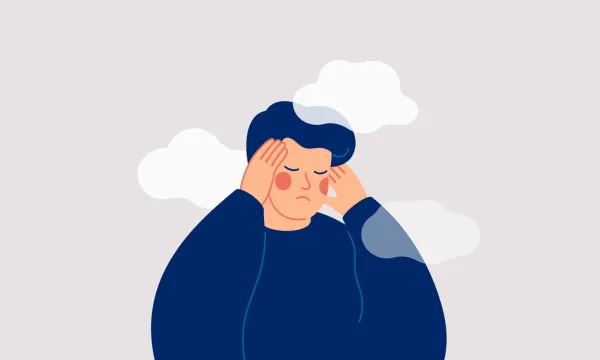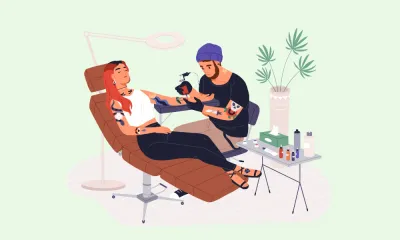Is there anything more swoon-worthy than the tale of a man's undying love for a particular woman? He ignores multitudes of beautiful women in favor of his one love. In his eyes, she's the most attractive woman to ever grace this planet.
Everything about her is perfect and her indifference only increases his passion. Like valiant knights of old, his noble efforts eventually win her over. They go on to live happily ever after.
It’s an epic love story - the kind we've grown to expect from old romantic films, and we can't help but laud the main character for his unwavering devotion. What we don't see is how the rest of the story usually plays out in real life.
Eventually, the man realizes that his beloved isn't anything like he'd made her out to be. Day after day, he's introduced to a new woman and she's nothing like the woman of his dreams.
The reality that she is a flawed human being hits him, causing him to spiral into depression. The truth that his one true love is far from perfect causes him to experience crushing disappointment.

The picture-perfect future he envisioned with his soulmate fades away, leaving behind a crippling sense of grief. His fears and insecurities are triggered as he struggles to come to terms with the fact that his special girl isn't as special as he once thought.
Bitterness turns him into someone she can barely recognize and the relationship deteriorates. Resentment and frustration set in and sadly, their love story meets a turbulent end.
This isn't a cruel twist of fate. It isn't even a true love story. It's a typical case of oneitis.
Things to know
- Oneitis is a term used to describe an unhealthy romantic obsession with a single person that is characterized by unrequited love and unrealistic idealizations. It is similar to infatuation and limerence, in that it involves attraction, fascination, fixation, and a deep emotional need for acceptance. It can last for months or even years and can cause negative impacts on mental and physical health.
- The attraction felt towards the object of oneitis is due to elevated levels of dopamine, causing feelings of euphoria and exhilaration that are so addictive that they make someone disregard all other romantic prospects and lead to a decline in mental health.
- To deal with oneitis, one should cut off all contact, consider their needs, accept reality, change thought patterns, adopt an abundance mindset, adjust expectations, meet new people, seek professional help, and focus on personal well-being.
Buckle up, here's what you'll learn about oneitis today:
- Understanding Oneitis
- Signs and Symptoms of Oneitis
- The Biology Behind Oneitis
- The Psychology Behind Oneitis
- Getting Over Oneitis
Understanding Oneitis
First used around 2004, oneitis is a term describing an unhealthy romantic obsession with a single person. It is characterized by unrequited love and completely unrealistic idealizations of the loved person. The condition causes someone to disregard other romantic prospects as they believe this particular person is 'the one'.
Infatuation
Like infatuation, oneitis involves attraction, fascination, and fixation on a particular person. While infatuation is primarily driven by physical attraction, oneitis is driven by fantasy and imagined attraction. It goes beyond physical or sexual attraction and involves a deep emotional need to be accepted.

Limerence
Similar to limerence, oneitis is a mental state of longing and obsession based on fantasy. While limerence tends to fade quickly, oneitis can last for months or even years. It could be comparable to the feeling that breaking up hurts so much.
Limerence is conditional while oneitis inspires fierce devotion. This blind devotion makes someone disregard all other romantic prospects and keeps them loyal to the object of their obsession no matter how many times they reject the affection.
Unrequited love
The 'one' can take on many forms.
A person you don't know well but see and interact with quite often, like a coworker, could be the object of your obsession. It could be someone you're actively pursuing or a long-term friend who has relegated you to the friend zone. It could even be an ex you've put on a pedestal.

Unavailability and unrequited love are common in all forms of oneitis. This combination fuels obsession and drives the delusions associated with the condition. If you're suffering from this, you might need to look into the signs he'll never come back to bring you back to reality.
A Disease-like Nature
To better understand the insidious nature of oneitis, look no further than its last four letters. In medical terms, 'itis' refers to inflammation, infection, or a mental state that is akin to a disease.
Oneitis, like any other disease, is influenced by both internal and external factors. Left untreated, oneitis can decimate your romantic relationships, ruin your dating life and wreak havoc on your well-being.
Signs and Symptoms of Oneitis
When was the last time a simple crush destroyed your life? Although some of the signs and symptoms of oneitis tend to mimic those of a crush or infatuation, its disease-like nature infects nearly every area of your existence.

Unrealistic Idealization
Your beloved is perfect. Even if you've barely interacted with them, you just know that they're special. Even when they repeatedly turn down your bids to connect, they are blameless. Everything seems to click into place when you see them, so they must be your soulmate.
You dote on the fleeting moments that you get to bask in their presence. You're so enraptured that you disregard all other romantic prospects. Because you view them through rose-tinted glasses, you ignore any early signs of incompatibility and other obvious red flags.
Unhealthy Obsession
Your obsession motivates you to find out anything you can about your beloved. You stalk them on social media and infiltrate their social circle. You study their whereabouts hoping to accidentally bump into them.

If you have mutual friends, you hound them for information. Everything you know about them isn't from actual conversations or time you've spent together. You exaggerate your superficial interactions and arrive at the wrong conclusions about their feelings for you.
A Loss Of Self
Keeping up with every tiny detail related to your love's existence causes you to neglect your own life. Without your beloved, life feels meaningless, so you take an interest in everything they do in order to feel closer to them.
You update your appearance to suit their preferences. By taking on their interests and hobbies, you hope to impress them. You even go as far as changing your habits, values, and mannerisms.
A Decline In Mental Health

You are plagued by intrusive thoughts of a certain special person on a daily basis. You can't seem to focus on anything. Even the quality of your work suffers. The overwhelming need to start living your dream life with them keeps you up at night. By day, your mood fluctuates between ecstasy and despair.
In the long run, your mental health deteriorates, making you more prone to depression and anxiety.
Lovesickness
Being obsessed with someone who won't even pay you a second glance negatively affects your physical health. You experience some of the classic symptoms of lovesickness like dizziness, heart palpitations, and lightheadedness. But that's not all - elevated stress levels lower your immunity, making you more likely to get sick.
The Biology Behind Oneitis
The attraction you feel to the object of your obsession is unlike anything you've ever experienced before, so you ascribe some cosmic relevance to it. They must be 'the one' because of how they make you feel right? No, it’s just your hormones.

Lover’s High
Your preference for your beloved is caused by heightened levels of dopamine - the pleasure hormone. The mere thought of them activates the same neural pathways as cocaine. The feelings of euphoria and exhilaration are so addictive that you constantly crave their presence. When you face rejection, the elevated levels of dopamine keep you motivated and fuel your relentless pursuit.
Hyper Awareness
Increasing levels of the stress response hormone norepinephrine cause exhilaration, excessive energy, sleeplessness, and even loss of appetite. This hormone is responsible for the hyperawareness you feel around them. It's also why you seem to remember even the smallest details about them.

Men vs Women
Although the roles in romantic relationships remain divided between men and women, biology continues to contradict these notions. There's an abundance of literature suggesting that oneitis only affects men, however, it can affect women too.
When men and women fall in love, they experience the same neurochemical and hormonal changes, with the exception of testosterone. Testosterone, the hormone associated with sex drive and aggression, increases in women and drops in men. The verdict is women can be just as obsessive as men when it comes to pursuing the objects of their affection.
The Psychology Behind Oneitis
We've all experienced the exhilaration of new love. We've also experienced the pain of rejection. What makes a person more susceptible to oneitis? Turns out the psychology behind oneitis is more complex than we can explore in a single article.

Here are a few things that stand out:
A Scarcity Mindset
A scarcity mindset causes you to obsess over the possibility that you might never find a romantic partner. You find it difficult to fathom that you have options and as a result, you latch onto a particular person.
The fear of ending up alone causes you to fantasize about a life with them, even when they are unavailable or show no interest in you.

The Soul Mate Myth
Your belief in soulmates causes you to obsess over your beloved. Your hopes and dreams hang suspended in time, waiting for them to realize that you are soulmates.
Because you cannot let your one chance at true love slip away, you fervently pursue them. You’re prepared to do whatever it takes to get the love you're destined to have.
Unhealthy Attachment
The blind devotion associated with oneitis is fueled by an unhealthy, premature form of attachment. Traumatic childhood experiences and dysfunctional family settings are usually to blame.
The strong attachment you feel to the object of your obsession isn't caused by mutual attraction or a real emotional bond, it's based on anxiety and an imagined sense of comfort.

Because the object of your obsession is 'made for you', they are the safest option. It’s not possible for them to hurt, neglect, or disappoint you as they understand exactly how to love you.
This one should be handled with caution. You might want to get your ex back, but is it for the right reasons?
Frustration Attraction
The person you desire remains frustratingly out of reach. They turn down your advances, despite your many attempts to connect with them. As painful as the constant rejection is, you continue to nurture your obsession.
Like a masochist, you embrace your suffering and derive satisfaction from it. The pain is your only connection to them, so you cherish it.
Goal Linking
The unhealthy romantic obsession associated with oneitis is always a means to a greater goal. For example, the lower-order goal of winning someone's affection is linked to a higher-order goal such as easing loneliness or being in a long-term relationship.
This is what makes giving up on this particular romantic interest so difficult. To give up on them is to give up on greater goals such as love and happiness.

Getting Over Oneitis
Dealing with a case of oneitis isn't as simple as getting over a high school crush. The complex biological and psychological factors involved call for a holistic approach.
Cut Off All Contact
The first step to recovery is to cut off all access to the object of your obsession. Stop stalking them on social media, resist the impulse to contact them and avoid seeing them for an extended period of time. No contact will allow the hormones that are feeding your obsession to fade and get you thinking clearly again.
Consider Your Needs

Your needs probably run much deeper than the object of your obsession. For example, you might have a strong need for love or acceptance. By recognizing that your needs go beyond a particular person, you're in a better position to let them go and start figuring out how you can deal with your own unmet needs.
Accept The Reality
Once you've identified your true needs, it's time to accept that you'll never get what you need if you continue pursuing someone who doesn't reciprocate your feelings. Accept that your feelings aren't grounded in reality: they are the result of idealization, fantasy, and obsession.
When you realize that your hopes, dreams, and goals aren't tied to the object of your obsession, the pressure to be with them will subside.
Change Your Thought Patterns
To identify and replace negative thought patterns, practice mindfulness. Be patient with yourself and choose to maintain a positive outlook. Take charge of your hopes, dreams, and goals, and use your mental energy to create a more fulfilling life for yourself.
Change Your Mindset

Ditch the soul mate myth. Thinking that you only have one possible match, in a world filled with billions of prospects, is keeping you stuck. The idea of ‘the one’ is grounded in scarcity.
Embrace an abundance mindset instead. There are plenty of people who will consider you attractive, reciprocate your feelings, and appreciate you - it's just a matter of finding them.
Adjust Your Expectations
Getting over your obsession requires you to adjust your unrealistic expectations of people and relationships. Accept that all human beings are flawed. By adjusting your expectations and understanding that human beings are flawed, you're less likely to idealize a potential romantic partner.
A healthy relationship is the result of mutual effort. Taking this into account increases your chances of selecting a long-term partner who is willing to work with you to build a healthy relationship.
Meet New People

Get out there and meet new people. This isn't to say that you should jump into a relationship with the first guy who smiles at you at the gym or the first single girl you meet at your new job. Let your improved understanding of needs, expectations, and healthy relationships guide you.
Thanks to online dating, connecting with romantic prospects has never been easier. You’re literally just a few swipes away from your next relationship.
Seek Professional Help
If you never address the reasons behind your obsession, you'll remain stuck in a vicious cycle of idealizing a potential partner. By working with a mental health professional you can understand your emotions, discover the source of your obsession, and begin the healing process.
Focus on Yourself

Your confidence and self-esteem will increase when you start investing time and energy into your own well-being. Breaking an obsession is never easy. Remember to be kind to yourself.









